David Gergen's Blog, page 9
May 23, 2011
A Middle East review, but not much new
By David Gergen, CNN Senior Political AnalystMay 20, 2011 -- Updated 0019 GMT (0819 HKT)
STORY HIGHLIGHTSDavid Gergen says two surprises in Obama speech could shape its impactObama outlined pivotal moment and restated U.S. principles, but issued no call to action, he saysOn Israel-Palestinian woes, Obama was down the middle, Gergen saysGergen: Long-term impact possible. Short-term? Not so much, in a region that needs it
Editor's note: David Gergen is a senior political analyst for CNN and has been an adviser to four U.S. presidents. He is a professor of public service and director of the Center for Public Leadership at Harvard University's Kennedy School of Government.
(CNN) -- In the president's speech on Thursday, there were two surprises that could shape its impact for a long time to come.
First, he broke away from the orthodoxy that normally accompanies "big" presidential addresses. Typically, a president begins by painting a broad context for his subject, including historical background, and then puts forward a set of principles that will guide his policies in the field.
This President Obama did masterfully. He recalled in a few short paragraphs why we find ourselves at a pivotal moment in the Middle East and North Africa and then proposed principles for action that placed the United States firmly on the side of freedom, democracy and economic development in that region of the world. Drawing as he does upon the Declaration of Independence, he once again provided oratorical brilliance.
But what normally follows in a "big" presidential address is a transition sentence that says, in effect: Therefore, I am announcing today that the United States will undertake the following three major policy steps. Unfortunately, this speech never delivered on what Winston Churchill liked to call "action this day."
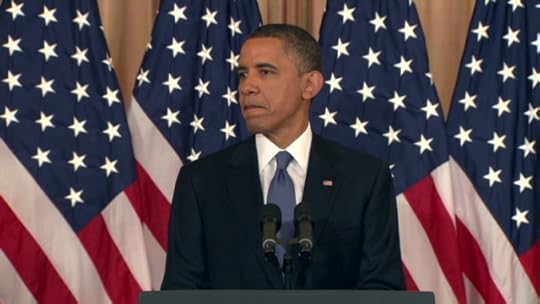 Obama pushes Mideast policy changeRELATED TOPICSMiddle EastBarack ObamaPalestinian PoliticsIsraeli PoliticsMiddle East Politics
Obama pushes Mideast policy changeRELATED TOPICSMiddle EastBarack ObamaPalestinian PoliticsIsraeli PoliticsMiddle East PoliticsInstead, its discussion was almost entirely a recital of what the United States and others are doing already -- actions that so far aren't working out nearly as well as anyone hoped.
Yes, the president did set forth some trade and assistance measures for Egypt and Tunisia, but by comparison to the economic crises that are beginning to unfold, especially in Egypt, they could hardly be seen as breathtaking or even major. It was pretty thin gruel for an area crying out for big changes.
Obama: New chapter in U.S. Mideast diplomacy
The other surprise in the speech was its coda: his handling of the Israel-Palestinian peace process that has gone so far off track and seems nearly moribund.
There had been hints that the president would take new initiatives, and there were growing fears in the Jewish community that he would put huge new pressures on Israel. The surprise was how sympathetic he was toward Israel, understanding its concern about Hamas becoming a possible negotiating partner on the Palestinian side and demanding nothing new in terms of concrete steps.
Yes, he was also sympathetic to the Palestinians, but unless I am missing something, this was one of the most balanced statements that Obama has offered on the peace process. Don't be surprised to hear critics argue that Obama was playing 2012 politics for the folks back home.
Some are interpreting the president's statement about borders as a dramatic change in policy, but as far back as 2009, the Obama team has called for negotiations based on 1967 borders plus agreed upon adjustments. Indeed, this has been the basis for negotiations stretching back more than a decade.
On the whole, then, the speech deserves high marks for pointing toward a long-term path forward -- perhaps one day people will look back and see it as a turning point for the U.S. in the region. But in terms of its short-term impact, it is hard to see what he has moved forward. And in the Middle East and North Africa right now, that is not exactly good news, as in country after country, the trend lines are moving in worrisome directions.
May 17, 2011
May 6, 2011
Remembering 9/11 and what's truly important
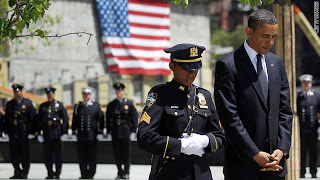
STORY HIGHLIGHTSDavid Gergen: Second-guessing threatens to obscure success of missionBin Laden, responsible for killing 3,000, was killed with no losses of nearby civiliansGergen says some questions are legitimate, but achievement shouldn't be downplayedHe says the values that bind Americans are greater than the differences
Editor's note: David Gergen is a senior political analyst for CNN and has been an adviser to four U.S. presidents. He is a professor of public service and director of the Center for Public Leadership at Harvard University's Kennedy School of Government. Michael Zuckerman, David Gergen's research assistant, contributed to this article.
(CNN) -- Since President Obama's dramatic announcement that America had successfully found and dispatched Osama bin Laden, we have been awash in questions and second-guessing about the mission. Were the SEALs wrong to shoot him? Why didn't the White House get the story right in its first telling? Why can't we see the photos? Were Americans wrong to celebrate?
The questions go on and on, chewed over endlessly. Some questions are of serious import: Where should we go from here with Pakistan and Afganistan? What should we now think of harsh interrogations by the CIA? But many of them have seemed secondary and distracting -- and are starting to diminish the glow of a daring venture.
Thankfully, Thursday's ceremonies honoring the victims of 9/11 in New York and Washington have helped to put things right again. They didn't put the debates to rest -- we can be sure that more will come -- but they went far toward healing America's wounds and in reminding us again of what is truly important.
One witness after another at ground zero spoke of a renewed pride in the country. What seemed on their minds was exactly what the president told firefighters at Fire Station 54 on Manhattan's West Side -- that the country would not only remember those who died that crisp September day but would also persist in bringing their killers to justice. From firefighters to families who still grieve, there was a quiet appreciation that when the chips are down, Americans are still capable of coming together and doing great things.
It's a shame that recognition can get lost in the jumble of second-, third- and fourth-guessing the achievement. Was the shooting justified? It seems to me that bin Laden's proximity to weapons, the defense his bodyguards put up and the dangers of the raid itself -- not to mention his own clearly deserved status as an "enemy combatant" -- more than justify the SEALs' decision.
We incapacitated a monster responsible for the death of nearly 3,000 innocent men, women, and children.--David Gergen
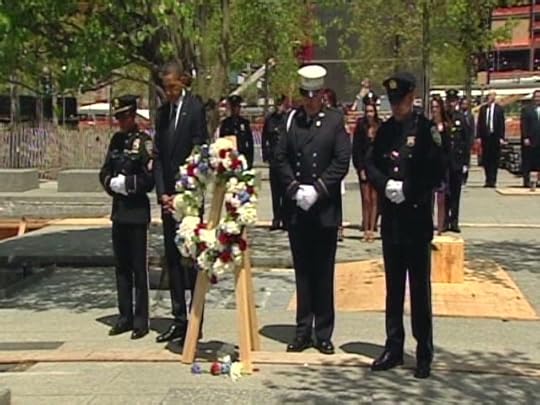 Remembering what happened at Ground Zero
Remembering what happened at Ground Zero Obama's day on hallowed groundRELATED TOPICSBarack ObamaOsama bin LadenSeptember 11 AttacksTerrorismThe White House
Obama's day on hallowed groundRELATED TOPICSBarack ObamaOsama bin LadenSeptember 11 AttacksTerrorismThe White HouseShould Obama have released the photos? It's a hard call, but we should give due respect the president's judicious concern that it might have stirred up trouble in the Muslim world.
Why couldn't the administration get the story right from the start? It's been frustrating to see the details shift so much in the past four days, but as my colleague Gloria Borger points out, we in the press don't help matters by demanding everything right away.
It's natural that we all wanted to know exactly what happened by 11:30 p.m. Sunday, but speaking from hard experience, it takes time for a White House to get a fully accurate sense of how a mission unfolds.
Most importantly, we shouldn't lose the forest for the trees. Whatever the hang-ups on this end of it, the United States still prosecuted a highly effective mission. With our most elite soldiers in the lead, we incapacitated a monster responsible for the death of nearly 3,000 innocent men, women and children -- and we did it with zero American casualties and zero civilian casualties in the surrounding area.
This victory -- borne heavily by our troops, intelligence officers and their families -- was 10 years in the making, and the president was right, in his remarks on Sunday night, to urge us to recall the unity that prevailed in the days and weeks following 9/11.
Just as that tragedy did, this triumph should remind us that the values that bind us together are much greater than the differences that push us apart. As we move to confront other challenges around the bend, it's important that we get the story straight. But it's more important that we don't get so wrapped up in our feet of clay that we forget we can still stand up together.
The opinions expressed in this commentary are solely those of the authors.
Remembering 9/11 and what's truly important By David Gergen
 STORY HIGHLIGHTSDavid Gergen: Second-guessing threatens to obscure success of missionBin Laden, responsible for killing 3,000, was killed with no losses of nearby civiliansGergen says some questions are legitimate, but achievement shouldn't be downplayedHe says the values that bind Americans are greater than the differences
STORY HIGHLIGHTSDavid Gergen: Second-guessing threatens to obscure success of missionBin Laden, responsible for killing 3,000, was killed with no losses of nearby civiliansGergen says some questions are legitimate, but achievement shouldn't be downplayedHe says the values that bind Americans are greater than the differencesEditor's note: David Gergen is a senior political analyst for CNN and has been an adviser to four U.S. presidents. He is a professor of public service and director of the Center for Public Leadership at Harvard University's Kennedy School of Government.
(CNN) -- Since President Obama's dramatic announcement that America had successfully found and dispatched Osama bin Laden, we have been awash in questions and second-guessing about the mission. Were the SEALs wrong to shoot him? Why didn't the White House get the story right in its first telling? Why can't we see the photos? Were Americans wrong to celebrate?
The questions go on and on, chewed over endlessly. Some questions are of serious import: Were the Pakistanis hiding bin Laden? Is it time to pare back our involvement in Afghanistan? But many of them have seemed secondary and distracting -- and are starting to diminish the glow of a daring venture.
Thankfully, Thursday's ceremonies honoring the victims of 9/11 in New York and Washington have helped to put things right again. They didn't put the debates to rest -- we can be sure that more will come -- but they went far toward healing America's wounds and in reminding us again of what is truly important.
One witness after another at ground zero spoke of a renewed pride in the country. What seemed on their minds was exactly what the president told firefighters at Fire Station 54 on Manhattan's West Side -- that the country would not only remember those who died that crisp September day but would also persist in bringing their killers to justice. From firefighters to families who still grieve, there was a quiet appreciation that when the chips are down, Americans are still capable of coming together and doing great things.
It's a shame that recognition can get lost in the jumble of second-, third- and fourth-guessing the achievement. Was the shooting justified? It seems to me that bin Laden's proximity to weapons, the defense his bodyguards put up and the dangers of the raid itself -- not to mention his own clearly deserved status as an "enemy combatant" -- more than justify the SEALs' decision.
We incapacitated a monster responsible for the death of nearly 3,000 innocent men, women, and children.--David Gergen
 Remembering what happened at Ground Zero
Remembering what happened at Ground Zero Obama's day on hallowed groundRELATED TOPICSBarack ObamaOsama bin LadenSeptember 11 AttacksTerrorismThe White House
Obama's day on hallowed groundRELATED TOPICSBarack ObamaOsama bin LadenSeptember 11 AttacksTerrorismThe White HouseShould Obama have released the photos? It's a hard call, but we should give due respect the president's judicious concern that it might have stirred up trouble in the Muslim world.
Why couldn't the administration get the story right from the start? It's been frustrating to see the details shift so much in the past four days, but as my colleague Gloria Borger points out, we in the press don't help matters by demanding everything right away.
It's natural that we all wanted to know exactly what happened by 11:30 p.m. Sunday, but speaking from hard experience, it takes time for a White House to get a fully accurate sense of how a mission unfolds.
Most importantly, we shouldn't lose the forest for the trees. Whatever the hang-ups on this end of it, the United States still prosecuted a highly effective mission. With our most elite soldiers in the lead, we incapacitated a monster responsible for the death of nearly 3,000 innocent men, women and children -- and we did it with zero American casualties and zero civilian casualties in the surrounding area.
This victory -- borne heavily by our troops, intelligence officers and their families -- was 10 years in the making, and the president was right, in his remarks on Sunday night, to urge us to recall the unity that prevailed in the days and weeks following 9/11.
Just as that tragedy did, this triumph should remind us that the values that bind us together are much greater than the differences that push us apart. As we move to confront other challenges around the bend, it's important that we get the story straight. But it's more important that we don't get so wrapped up in our feet of clay that we forget we can still stand up together.
(Michael Zuckerman, David Gergen's research assistant, contributed to this article.)
The opinions expressed in this commentary are solely those of the authors.
May 5, 2011
Ground Zero Visit By President Obama

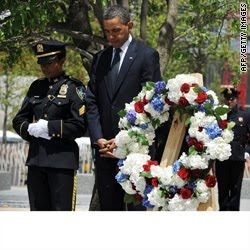
CNN- David, you worked for four American presidents. The tone that President Obama sets today on this, the few days after bin Laden has been killed, is very, very important, because you don't want to be overtly political on such a sensitive day.
DAVID GERGEN, CNN SR. POLITICAL ANALYST: And not overtly celebratory either. And so I think the wreath-laying is meant to convey very much a sense of dignity and honor, that the president -- it's a quieter ceremony than perhaps we would have expected.
We all remember, Wolf, how George W. Bush went there just after 9/11, and famously was so defiant. And when people yelled at him, "We can't hear you, Mr. President!" firemen and policemen, he yelled back, "But I can hear you, and so can all of America!"
And that was a moment in which we had to rally people and sort of come together and fight this terrorism. And now, President Obama comes a decade later, after a decade of war, to the most important shrine we have to the beginning of this war. 9/11, this site is almost to America now what Pearl Harbor is to our national memories.
And I'm Wolf Blitzer, here in Washington, D.C.
President Obama's visit comes just six days of he ordered the raid that killed the al Qaeda leader Osama bin Laden, the architect of the terrorist attacks.
We're standing by. The president, right now, is inside a fire station. He's having lunch with firefighters.
He will then leave there. Rudy Giuliani, the former of New York City, who was the mayor on 9/11, he's joined the president. He's there with the president right now.
The president will go lay a wreath at a memorial at Ground Zero, and then he will meet privately with family members, survivors of some of those killed on 9/11.
Our senior political analyst David Gergen is joining us now from Cambridge, Massachusetts. He was an adviser to former Presidents Nixon, Ford, Reagan and Clinton.
Take us inside a White House on a day like this. And it's an extraordinary day. Since the death of bin Laden, it's been an extraordinary several days.
David, take us inside the decision-making process that leads a president to make this decision to go to New York.
DAVID GERGEN, CNN SENIOR POLITICAL ANALYST: Well, Wolf, much of the focus in the White House, of course, almost the complete focus, was trying to get bin Laden. And that was an enormously complicated 24 interagency meetings, no leaks, a lot of discipline showed. But then there comes a time once you get the objective, or something really happens inside a White House, you begin to asking yourself, OK, how can we properly commemorate this moment? What's the right way to do it?
And coming to this site, 9/11, again, so analogous to going to Pearl Harbor and remembering World War II and remembering those veterans, this was a way for the president to say, we keep our promises. We promised we'd remember you, and we're doing that. But just as important for this White House, Wolf, as you know, has been a sense that getting bin Laden was about keeping a promise to the world that we would do justice, that we would seek justice as we would not let him go unpunished. And what's in the White House right now is a very quiet sense of satisfaction that we have sent a message that we will keep our promises, we will be persistent, and we have the reach and capability to keep our promises. They think that's a very important message to send to the Middle East and against al Qaeda all around the world.
BLITZER: And we're looking at these live pictures from the site. Security, obviously, very intense. We see some family members there getting ready.
The president will be going there. He'll be laying this wreath, as we've been saying.
Talk a little bit, David, about the decision to have Rudy Giuliani, the mayor -- the former mayor of New York, join the president inside that fire station right now. He received the president when he landed aboard Marine One in lower Manhattan and he's with him right now. This is something important, especially because the former president, George W. Bush, who was invited, decided not to go right now.
GERGEN: That's a very important point, Wolf. And they would have liked to have George W. Bush there, but they certainly understand, I think everybody understands, the Bush tradition, as you know so well. The Bush father and son both believe we only have one president at a time. And he'll come back in September for the 10th anniversary. But this was President Obama's moment. He was the one who got him, in effect.
But beyond that, Rudy Giuliani, you know, helps to bring it back full circle, because he became the face of 9/11 of a defiant America, of a America that was courageous in the face of adversity. And his leadership in that moment, you know, this Churchillian quality that he showed, was something that was so important to rally the United States in 9/11, and the leadership he showed once it followed. He never made it to the presidency, but he'll always be remembered, as John King said earlier, as America's mayor.
BLITZER: He certainly will. America's mayor, indeed. Rudy Giuliani, appropriate for him to be with the president of the United States in Manhattan right now.
David, where do you think this story of Osama bin Laden, of the killing of him, goes? Because, I mean, over the last several days, it has evolved, questions have been raised. Do you think that continues or do you think after today people start to move on or -- and not sort of pursue the details so much?
GERGEN: Well, Anderson, we -- the president is going to Kentucky tomorrow, as you know, and to thank the troops. And that's also going to be an important day.
But I've been wondering the same thing you have, because there have been so many -- there's been this sort of storm of questions, second guessing so many aspects of Sunday night since Sunday. And yet today is bringing us back, doesn't it, to the importance of what happened and how we're bringing, perhaps to an end, 10 years of warfare and how important the killing of bin Laden has been.
I think today has been one which the president is succeeding at the call he made on Sunday night. At first when he said it, I wasn't sure it would ring true, but I think it is now, and that is his call for national unity. His visit to New York seems to me to -- and reaching out to the firefighters and the police and doing so well with the families is deepening the sense of unity, you know, and hopefully prolonging it. And I think that maybe it will override some of these -- the questioning, the carping that we've seen in the last few days.
So I think it's a really good question, will this now change the tone back to -- and put us back on a higher level? I hope so.
COOPER: Now, John King, what do you think?
KING: I think that the tone in Washington will change, but not for long because of the substance and the profound disagreements over the issues to come. However, if there's more of a sense of respect and a sense of community heading into those debates, maybe they'll be more civil.
I do think to your point about will there be more questions asked about the specifics of the operation? Of course there will be. I do think, though, that for those especially here and the families, you're hearing more of the pain today, the personal -- there's many chapters in what we now call the war on terror. There are 100,000 troops still in Afghanistan. Al Zawahiri, the number two, is still out there. Al Awaki, the al Qaeda in the Arabian peninsula, has emerged. An American, a 40-year-old American could be the global face of terrorism right now. Those narratives will continue. But I do think that wreath laying is the final page in the hunt for bin Laden chapter. The personal part of it.
-Partial transcript from CNN's special coverage today -
May 3, 2011
May 2, 2011
A victory for Obama -- and America
By David Gergen, CNN Senior Political AnalystMay 2, 2011 9:08 a.m. EDT
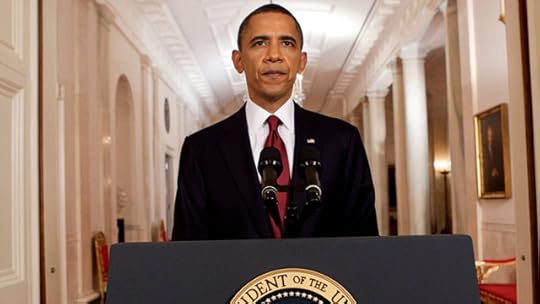 President Barack Obama announces the killing of Osama bin Laden from the White House on Sunday night.STORY HIGHLIGHTSDavid Gergen: Americans saluted the news of Osama bin Laden's deathHe says it immensely strengthens Barack Obama's presidency and his teamIt's too early to tell what ultimate consequences will be, Gergen saysGergen: Obama was wise to emphasize theme of national unity
President Barack Obama announces the killing of Osama bin Laden from the White House on Sunday night.STORY HIGHLIGHTSDavid Gergen: Americans saluted the news of Osama bin Laden's deathHe says it immensely strengthens Barack Obama's presidency and his teamIt's too early to tell what ultimate consequences will be, Gergen saysGergen: Obama was wise to emphasize theme of national unityEditor's note: David Gergen is a senior political analyst for CNN and has been an adviser to four U.S. presidents. He is a professor of public service and director of the Center for Public Leadership at Harvard University's Kennedy School of Government.
Cambridge, Massachusetts (CNN) -- It is far too soon to judge the long-term significance of America's successful operation to kill Osama Bin Laden. Will al Qaeda begin to crumble now that its charismatic leader is dead, or will we endure new terrorist attacks, perhaps on U.S. soil?
Will the poisonous relationship between the U.S. and Pakistan now heal, or will there be new strains, especially if it turns out that elements of the Pakistani government were harboring bin Laden? Questions abound.
Yet it is already clear that assuming the facts hold as we know them now, President Barack Obama and his national security team have been enormously strengthened in the near term. The outpouring of joyous crowds on the streets of New York and Washington -- where people were chanting "USA! USA!" -- show that the news not only electrified Americans but brought us together as a people in a way we haven't seen since 9/11.
Analyst: A deathblow to al Qaeda?
 Obama: Bin Laden a murderer
Obama: Bin Laden a murderer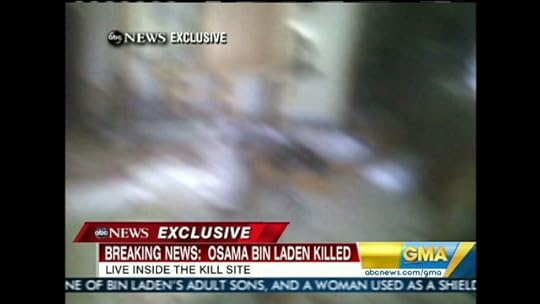 Inside the place bin Laden was killed
Inside the place bin Laden was killed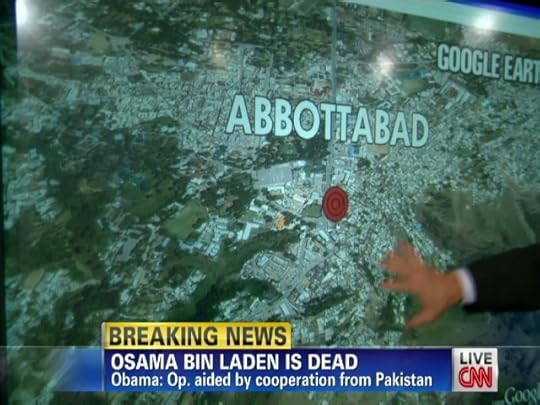 Hideout wasn't remote cave after all
Hideout wasn't remote cave after all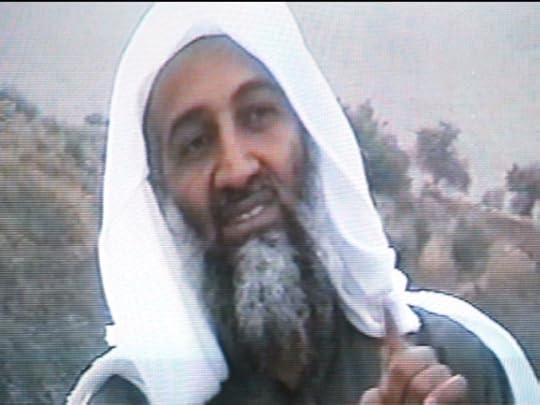 Timeline of bin Laden's death
Timeline of bin Laden's deathWith good reason. Bin Laden was not only the most hated man since Hitler but he was also the most hunted man in the world. His killing was unabashedly good news. And Americans have desperately needed some good news: After all, the past decade since 9/11 has not only seen us drawn into wars that drag on and on -- without victory -- but we feel the sting of terrorists every time we enter an airport. Since our economy nearly collapsed, the inability of our leaders to restore jobs and prosperity has also left us feeling increasingly helpless as a a great nation. Finding and killing bin Laden was a huge tonic.
All of this is likely to have important repercussions:
• Sunday night was the best of the Obama presidency, injecting a much needed boost into his credibility as a leader. On the Internet, many were arguing that with bin Laden dead, it is time to bring home the troops from Afghanistan and Iraq. That sentiment is likely to grow. But Obama and Co. are now in a much stronger position to end the wars on their own timetables -- longer or shorter, whatever they see fit.
• Moammar Gadhafi also has more reason to worry now about his personal safety. NATO airstrikes have already come perilously close for him, and now if one were to hit him, Obama is in a much better position to ride out the storm.
• For his national security team, Sunday night was hugely good news, too. Both Leon Panetta and Gen. David Petraeus should have easy confirmations for their new roles -- indeed, they may be festooned with laurels -- and Panetta in particular will carry enhanced credibility into his new role of protecting national security even as he squeezes more out of the Pentagon budget. National Security Council adviser Tom Donilon will also see his stature grow: He shepherded the bin Laden planning through the government. It was one of his first big trials and by all appearances, he passed with flying colors -- and no leaks.
The news not only electrified Americans but brought us together as a people in a way we haven't seen since 9/11.--David GergenRELATED TOPICSBarack ObamaOsama bin LadenLeon PanettaPakistanTerrorism
• At home, this development comes just as Vice President Joe Biden prepares to begin negotiations this week over raising the national debt ceiling. Neither Republicans nor Democrats will abandon their principles because of bin Laden's dispatch, but this is hardly a propitious moment for Republicans to risk taking the country too close to the edge of a default. Obama was wise to strike a theme of national unity Sunday night in his announcement: It could serve him well in the near-term budget negotiations.
• Of course, folks on the Internet are already proclaiming that Sunday night has sewn up Obama's re-election. "Obama got Osama! Obama got Osama!", the cheer went. But we have seen so many twists and turns in national affairs recently -- and jobs are still scarce and gas prices high -- so that it would be foolhardy to insist that this is a game changer. Remember that President George H.W. Bush kicked Saddam Hussein out of Kuwait in a big victory in his third year, and he lost re-election in his fourth year. So it's too early to know. But it is clear that Obama has just increased his clout -- and that will not only bolster a growing war chest but could discourage some Republicans from jumping in.
In short, there are more questions than answers about what impact the killing of bin Laden will have, but we do know this: For both George W. Bush and Obama, catching bin Laden was the big prize. Whoever got him would carry a bigger stick. And that's what Obama has just done. Anyone who now argues that he is too weak as a leader will face the inevitable reply: "Yeah, well look at who got Osama." Obama now walks taller, both at home and overseas.
The opinions expressed in this commentary are solely those of David Gergen.
April 27, 2011
The marginalization of a president: Will it end with Obama?
By David Gergen and Mike Zuckerman
April 27, 2011 11:42 p.m. EDTEditor's note: David Gergen is a senior political analyst for CNN and has been an adviser to four U.S. presidents. He is a professor of public service and director of the Center for Public Leadership at Harvard University's Kennedy School of Government. Mike Zuckerman is a research assistant for Gergen. He graduated magna cum laude from Harvard College in 2010.
(CNN) -- Once again, our country seems to be mired in a tired, frustrating conversation about President Obama's citizenship. Seems like we've been down this road before.
This time, the prime (and prime time) culprit is Donald Trump. He has seen his poll numbers rise and played the American public by latching on to the absolutely bogus myth that the 44th president of the United States may not have been born in the USA. And by doing so, he's just the latest in a string of presidential conspiracy theorists.
In fact, ever since then-Sen. Obama burst onto the scene, there have been efforts to delegitimize him in the eyes of the public. We have heard suggestions that he was born everywhere, from here to (just east of) Timbuktu. We have heard Obama called a "secret Muslim" and a radical Christian. We have heard that he "pals around with terrorists" and that he's a closeted socialist with deep-seated anti-colonial rage bent on taking down the United States of America from within. So it's not hard to understand why the satirical newspaper The Onion joked that a sizeable minority of Americans are now fearful that the president is, in fact, "a cactus."
Today, President Obama put it to rest. Or at least he tried to.
White House releases Obama's birth certificate
He asked his lawyers to persuade the Hawaii Department of Health to bend their rules and release his long-form birth certificate, a document that ended up having about as much scandalous copy as the back of a box of Girl Scout cookies.
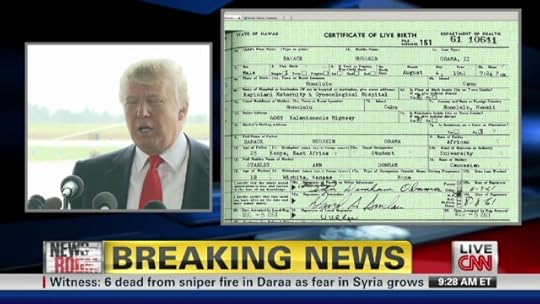 Trump to vet Obama's birth certificate
Trump to vet Obama's birth certificate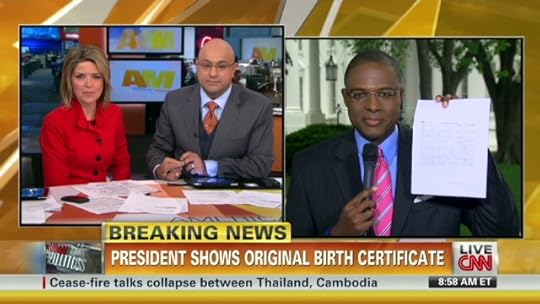 Obama shows original birth certificate
Obama shows original birth certificate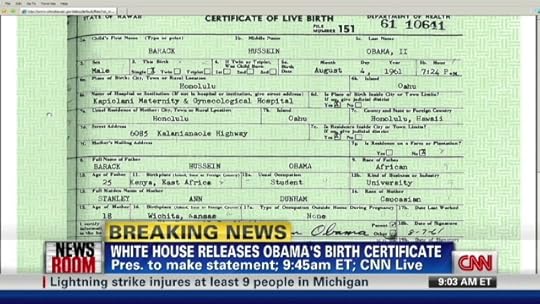 Tuchman: 'Trump is wrong'RELATED TOPICSBarack ObamaDonald Trump
Tuchman: 'Trump is wrong'RELATED TOPICSBarack ObamaDonald TrumpBut no sooner did the president release his birth certificate than the leading lights of the "birther movement" lined up to take shots at their next target. Now they're questioning Obama's Social Security number, the use of his grandparents' address in his birth announcement, and the identification of his father's race as "African" on the birth certificate. They even wonder, out loud, about his undergraduate grade point average at Occidental College. When he was 19. (For the record, Obama went on to Columbia University and graduated magna cum laude from Harvard Law School.)
Will this "sideshow" -- to use the president's term -- ever end? History, unfortunately, isn't on his side.
Why Obama is not first 'imposter' president and won't be the last
This pattern of vilifying one's political opponents is as old as the republic itself. John Adams, for example, our second president and by all accounts a decent and patriotic man, several times called our first Treasury secretary, Alexander Hamilton, who had been born out of wedlock, "the bastard brat of a Scotch peddler."
As CNN's John Blake noted last year, President Rutherford B. Hayes was regularly referred to as "His Fraudulency" after winning the presidency in the disputed election of 1876. And all this fuss about Obama's birth certificate bears a striking resemblance to what happened to another black U.S. politician.
As The Atlantic's Garrett Epps points out -- drawing on the research of legal scholar and law professor Richard Primus -- America's first black U.S. senator, Hiram Revels, had his swearing-in delayed for several days because Democrats in the chamber said he had not yet been "nine years a citizen of the United States," as required by Article II of the Constitution. The Fourteenth Amendment -- the one that guaranteed citizenship to black Americans -- had only been ratified two years earlier, in 1868.
Despite this long tradition of trying to delegitimize a leader through personal attacks, these accusations reached a more frenzied pitch in the last few decades. President Lyndon Johnson was dogged by conspiracy theories that he played a role in the assassination of President John F. Kennedy, accusations that made it all the way onto Oliver Stone's movie screens in the '90s.
While President Bill Clinton was in office, we heard crackpot theories ranging from airplanes loaded with cocaine on the tarmac in Mena, Arkansas, to the unending cries of foul play regarding Clinton confidante Vince Foster's 1993 suicide (a 1995 Time-CNN poll, conducted during the Senate hearings into the matter, found that only 35% of adults were convinced it was a suicide).
And who could forget the claims that President George W. Bush allowed -- or even ordered -- the 9/11 attacks? Ross Douthat noted last year that a third of Democrats, as late as 2007, still believed Bush had prior knowledge of the plot. Incredible.
11 political myths and conspiracy theories
It is often easier to attack a person's character than it is to fight it out on the merits of his or her policies. And, as we've already seen, even with Obama's long-form birth certificate in the open, more questions will arise. But they aren't the questions we should be asking. The questions we should be asking are the tough questions: How do we create more jobs in America? How do we seize control of our spiraling deficits? How do we remain competitive as a nation in the century ahead? The conspiracy questions might be easier to ask, and they might score points for the people who ask them, but they don't score points for this republic.
Like plenty of conspiracy theorists before them, the birthers have had their day in court. President Obama called their bluff and showed his cards, producing the documentation they requested.And so here it is.
Now it is time for us to turn our attention back to the real questions that need answers. It's time to move on.
The opinions expressed in this commentary are solely those of David Gergen and Mike Zuckerman.
David Gergen's Blog
- David Gergen's profile
- 24 followers



